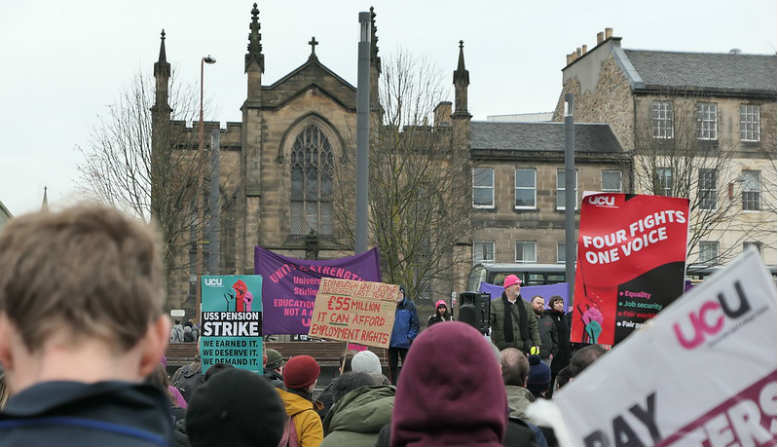 UCU Strike Edinburgh Nov 19. Photo: Flickr - Magnus Hagdorn
UCU Strike Edinburgh Nov 19. Photo: Flickr - Magnus Hagdorn
Higher turnout likely than last year but the strike needs solidarity from the whole labour movement, argues Vladimir Unkovski-Korica
Last Thursday, the UCU’s higher education committee (HEC) voted for 14 more days of strike action in the pensions and ‘four fights’ disputes.
The action will be spread over four weeks starting from 20th February 2020. It will include 2 days in the first, 3 days in the second, 4 days in the third and 5 days in the last week of the strike.
This is designed to maximise disruption and allow for time for negotiations between strike periods. It will stop most teaching and may also hit various kinds of marking and assessment.
Turnout is likely to increase in comparison with the November strike, as 14 more institutions voted in favour of strike action after being re-balloted.
Staff at 74 institutions will now be walking out, which covers more than half of higher education institutions, and probably the bulk of students.
Some big universities with around 20,000 students or more have joined the action, including King’s College, Imperial College and University of Greenwich in London, De Montfort University in Leicester and the University of Huddersfield in West Yorkshire.
In a sign that feeling is still strong in some universities where staff took action back in November, UCU members at the University of Oxford and the University of East Anglia voted to take action in relation to both disputes (and no longer just the one, as previously).
This bodes well for the upcoming strike. More institutions will be hit by strike action, and all the indications are that large numbers of those who took action in November will take action again, despite the loss of pay and all the stress involved in walking out.
Emotions will be running high in some new ways too. We recently saw staff walk out at SOAS in London, after major cuts to casual academic staff and institutionally-funded research leave for full-time staff. And the University of Sunderland announced it will be closing modern languages, history, politics and public health courses – despite a healthy economic outlook.
Anger following the ever-deepening market transformation of the sector and attacks on workers is mounting, especially as there seems to be money to spare: the sector posted a £1 billion surplus and much money is seen as wasted on high management salaries, new buildings and useless exercises like the mini-REF and progress and development reviews.
But the current strike is reaching a critical stage. Staff who have been losing pay and facing ever more difficult conditions have already lost 8 days of pay in strike action last year without seeing tangible gains. The prospect of another 14 days of pay loss will be a difficult sacrifice for people on casual contracts, those with families and mortgages, and many facing vindictive employers.
The threat of a strike and possible further action, including a formal assessment boycott, over the summer, will however be concentrating minds among employers too. They have already made placating moves in relation to pensions and ‘loose commitments to address casualisation and pay inequality’, though they have done little in relation to unsustainable workloads and pay. This was after the strike in November forced them to negotiate.
The more solid the turnout in February and March, the more likely that a deal favouring staff will be tabled. But to ensure as few as possible suffer in the strike action, the labour movement needs to swing into action. This is a set-piece struggle to defend the public sector and the notion of the common good against austerity and market-driven change. It affects us all.
We need unions to pass solidarity resolutions, send delegations to UCU picket-lines and make sizeable donations to our strike fund, to help precarious staff who now make up over 50 percent of university workforces make ends meet during the strike.
We need the widest possible show of support at our union rallies and as much favourable coverage of our strike as possible in public meetings and alternative media.
And our own union will need to find ways to involve as many members as possible in order to sustain all 14 days in case of need. Vibrant rallies, large pickets, consistent meetings to take input from rank-and-file members and solidarity with students will be absolutely central to our success.
The stakes are high but a victory for UCU would be a massive step forward for the entire labour movement at a time when union and worker rights are facing a sustained neoliberal assault.

